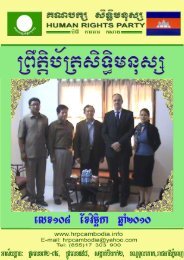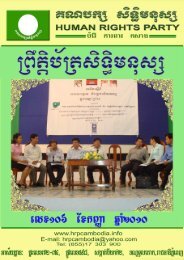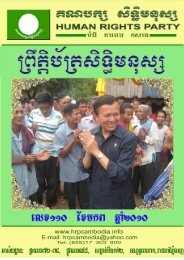Losing Ground - Human Rights Party.
Losing Ground - Human Rights Party.
Losing Ground - Human Rights Party.
You also want an ePaper? Increase the reach of your titles
YUMPU automatically turns print PDFs into web optimized ePapers that Google loves.
<strong>Losing</strong> <strong>Ground</strong><br />
then commune, district, provincial and national officials,<br />
before holding their first civil protest at the site. Five<br />
monitors from human rights NGOs (ADHOC, LICADHO<br />
and Sor Sor Troung) were present. The charges from the<br />
company were filed a few days after Mr. Keth spoke at a<br />
news conference in Phnom Penh about the loss of their land.<br />
Criminal charges<br />
Although there was no indication that villagers touched the<br />
company’s property, on October 18 five men were initially<br />
summoned.<br />
One was a ghost name, someone who did not exist;<br />
another was a man who neighbors said was home with his<br />
wife who was giving birth the day of the protest, and the<br />
others were: Mr. Vy, accused because he agreed to write a<br />
list of the people attending the protest; Mr. Saren, because<br />
he was known to be the leader, and Mr. Rath, who his<br />
neighbors think was chosen at random.<br />
The robbery charge stemmed from the company’s claim<br />
that the villagers stole 10 million Cambodian riel ($2,500)<br />
stuffed in a bag hung from the roof of one of the tents.<br />
About 200 villagers made the hour long trip to the court<br />
with Mr. Vy, Mr. Saren and Mr. Rath, but the court shut<br />
the doors when they arrived and cancelled the hearing, and<br />
provincial officials refused to meet them.<br />
“Criminal charges in civil land disputes are<br />
becoming common. It’s a new way of intimidating<br />
and threatening the village residents.”<br />
Yeng Virak, CLEC executive director.<br />
The court prosecutor said he couldn’t meet with hundreds<br />
of people. “They can come to court with their lawyers,” he<br />
said. But a representative from ADHOC said the risk of<br />
arrest is very high if villagers go alone without the support<br />
of others in the community. “It has been the case when they<br />
call villagers to explain [charges] they put them in custody.”<br />
The prosecutor denied the charges were brought to<br />
intimidate the residents, but said the robbery charge<br />
sounded peculiar to him because no one would keep “this<br />
much money in a small bag.” He indicated the charges could<br />
be lessened or dropped.<br />
However, he no longer handles the case; it has moved up<br />
the legal chain to the investigating judge, who can reactivate<br />
it at any time.<br />
Company work sites in Snoul district<br />
where a rubber plantation developer<br />
received an Economic Land Concession<br />
from the provincial governor in 2008<br />
without the knowledge of residents.<br />
Forced Evictions and Intimidation in Cambodia<br />
41






